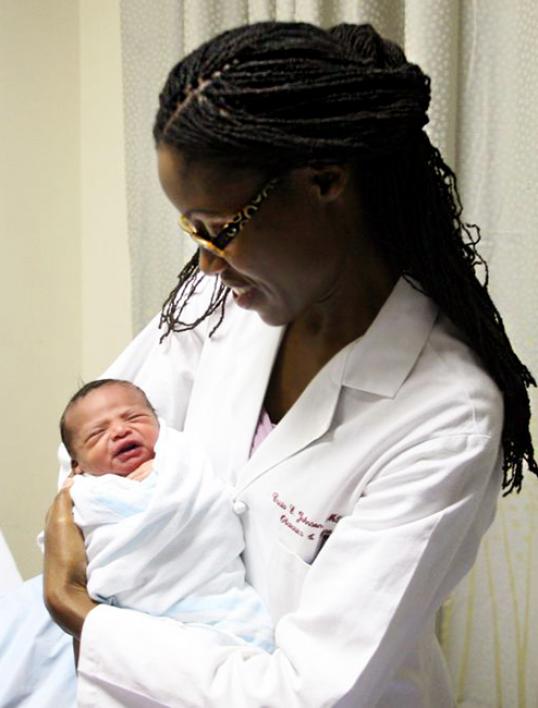Doctors have myriad life-saving technologies at their fingertips, but they can all be rendered useless without human warmth and community connection.
That’s what drives the work of Crista Johnson-Agbakwu, an assistant research professor in Arizona State University’s School of Social Work and clinical research affiliate with the Southwest Interdisciplinary Research Center (SIRC). She’s also a doctor of obstetrics and gynecology.
“We are examining challenges and barriers to care in vulnerable, underserved and hidden populations,” Johnson-Agbakwu said. “It’s essential to have this kind of community-based care that builds trust.”
Case in point: A Somali mother-to-be developed a life-threatening pregnancy complication a few months after arriving in Phoenix as a refugee. It required immediate delivery of her child.
Exhausted from spending years of her life in one of the world’s largest refugee camps and unable to speak the language of her newly adopted country, she was fearful and intimidated by a healthcare system completely foreign to her.
Despite extensive counseling and education, and even when faced with the likelihood both she and her baby would die as a result, the woman refused.
“She was terrified,” Johnson-Agbakwu said. “We tried to explain it to her for two weeks, but we were getting nowhere.”
The question was why.
Where some might scorn the expectant mother’s seeming disregard for herself and her child or throw up their hands in despair at a patient resolved to act against medical advice, Johnson-Agbakwu and others saw an obstacle requiring extra care, warmth and connection.
As director of the Refugee Women’s Health Clinic, part of Maricopa Integrated Health System, Johnson-Agbakwu and her staff felt confident they could still help this patient and her unborn baby.
They began mobilizing their contacts in the local Somali community along with the patient’s refugee resettlement case manager. They brought in a local community advocate as well as a sheikh (the premier Islamic religious authority for the Somali community in Arizona), who met with the woman and provided religious clarity, encouragement and support. With her anxieties alleviated, she felt empowered to make an informed decision, and she opted to move forward with the delivery.
The result? The clinic’s obstetrics team successfully delivered a healthy newborn and saved the life of the mother.
The Refugee Women’s Health Clinic was founded by Johnson-Agbakwu in 2008. She also leads Community-Based Participatory Research (CBPR) in the Office of Refugee Health at SIRC, one of two dozen research units in the College of Public Service and Community Solutions.
“There needed to be a safe space where people could speak their native language while navigating an intimidating healthcare system,” said Johnson-Agbakwu.
The clinic has grown tremendously in the nine years since its inception, caring for more than 5,000 women speaking 41 languages from over 51 countries across Sub-Saharan Africa, Southeast Asia and the Middle East. Its multilingual staff includes refugee women who serve as cultural health navigators. Together, they speak 13 languages fluently and offer a team-based approach to health care.
Johnson-Agbakwu built up the clinic from scratch by working with Maricopa Integrated Health System, the state’s only safety net hospital for the most vulnerable in our society. This allowed her to seamlessly integrate the community-based model of CBPR every step of the way. By fostering connections and partnerships within the communities they serve, the staff built that most essential and elusive quality into their practice: trust.
“Being out in the community, pounding the pavement, letting the people know they have your full support — it takes a significant investment,” Johnson-Agbakwu said. “But it’s necessary. Their views matter, and our initiative is focused on a shared vision and shared goals with the very people we serve. Without the relationships built through our research at SIRC, the outcome with the Somali mother would not have been possible.”
Top photo: Crista Johnson-Agbakwu meets with one of her patients at the Refugee Women's Health Clinic housed in Maricopa Integrated Health System.
More Health and medicine

The science of sibling dynamics: Why we fight, how we relate and why it matters
We have Mother’s Day, Father’s Day and even Grandparents’ Day. But siblings? Usually they get a hand-me-down sweatshirt and, with any luck, a lifetime of inside jokes.But actually, there is a…

New study seeks to combat national kidney shortage, improve availability for organ transplants
Chronic kidney disease affects one in seven adults in the United States. For two in 1,000 Americans, this disease will advance to kidney failure.End-stage renal failure has two primary…

New initiative aims to make nursing degrees more accessible
Isabella Koklys is graduating in December, so she won’t be one of the students using the Edson College of Nursing and Health Innovation's mobile simulation unit that was launched Wednesday at Arizona…





